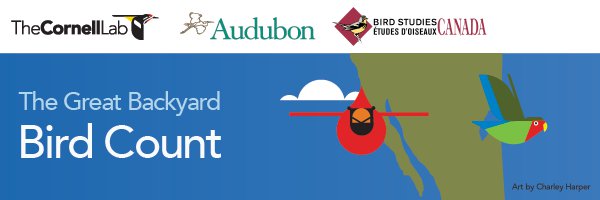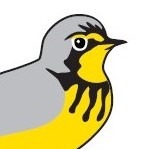The Great Backyard Bird Count takes place worldwide, February 16 to 19
Port Rowan, Ontario (February 7, 2018) – The 21st Great Backyard Bird Count (GBBC) will take place February 16 to 19 – in backyards, parks, nature centres, on hiking trails, school grounds, balconies, and beaches. This global event provides an opportunity for bird enthusiasts to report important bird sightings to help scientists see changes over the past 21 years. To participate, birdwatchers count the birds they see for at least 15 minutes on one or more days of the count, then enter their checklists at birdcount.org.
“The 2018 GBBC again promises to provide an important snapshot of bird occurrence in February,” says the Cornell Lab of Ornithology’s Marshall Iliff, a leader of the eBird program. “Some stories to watch include crossbills on the move across much of the continent, and many eastern birds responding to extremes as the winter temperatures have oscillated between unseasonably warm and exceptionally cold.”
eBird collects bird observations globally every day of the year and is the online platform used by the GBBC.
“The Great Backyard Bird Count is a great way to introduce people to participation in community science,” says Dr. Gary Langham, vice president and chief scientist for the National Audubon Society. “No other program allows volunteers to take an instantaneous snapshot of global bird populations that can contribute to our understanding of how a changing climate is affecting birds.”
In 1998, during the first GBBC, birdwatchers submitted about 13,500 checklists from the United States and Canada. Fast-forward to the most recent event in 2017. Over the four days of the count, an estimated 240,418 birdwatchers from more than 100 countries submitted 181,606 bird checklists, reporting 6259 species–more than half the known bird species in the world.
“Will we break last year’s record number of Canadian participants?” asks Jon McCracken, Bird Studies Canada’s National Program Director. “A lot depends on the weather, but a little snow and cold shouldn’t get in your way. Remember that you don’t have to venture far afield at all. You truly can count birds right in your own backyard or, better yet, take a pleasant winter stroll around your neighbourhood.”
To learn more about what scientists discovered the past 21 years and how to take part in the Great Backyard Bird Count, visit birdcount.org. The Great Backyard Bird Count is a joint project of the Cornell Lab of Ornithology and the National Audubon Society with partner Bird Studies Canada, and is made possible in part by sponsor Wild Birds Unlimited.
Editors: See the winners of the 2017 GBBC Photo Contest. If you find a winner from your coverage area, please let us know if you would like a copy of the image for web or print (if high resolution is available).
Other media images available here.
Contacts:
• Canada: Kerrie Wilcox, Bird Studies Canada
(519) 586-3531 ext. 134, kwilcox@birdscanada.org
• U.S.: Nick Gonzalez, Audubon, (212) 979-3100, media@audubon.org or
Pat Leonard, Cornell Lab of Ornithology, (607) 254-2137, pel27@cornell.edu
About Bird Studies Canada
Bird Studies Canada advances the understanding, appreciation, and conservation of wild birds and their habitats. We are Canada’s national body for bird research, conservation, Citizen Science, and education, and we are a non-governmental charitable organization. www.birdscanada.org
About Audubon
The National Audubon Society protects birds and the places they need, today and tomorrow, throughout the Americas using science, advocacy, education and on-the-ground conservation. Audubon’s state programs, nature centers, chapters and partners have an unparalleled wingspan that reaches millions of people each year to inform, inspire and unite diverse communities in conservation action. Since 1905, Audubon’s vision has been a world in which people and wildlife thrive. Audubon is a nonprofit conservation organization. www.audubon.org
About the Cornell Lab of Ornithology
The Cornell Lab of Ornithology is a nonprofit membership institution interpreting and conserving the earth’s biological diversity through research, education, and citizen science focused on birds. www.birds.cornell.edu


